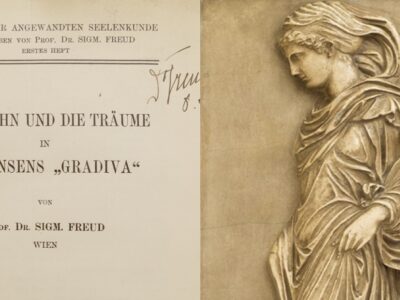Adopt a Book from Freud's Library
The important volumes listed below are particularly at risk and are in urgent need of conservation.
By adopting a book, your donation will ensure that it is restored to a stable condition, safe for handling by curators and researchers for years to come.
In return, you will
- Receive a special Sigmund Freud Ex-Libris Certificate
- Updates on the progress of the conservation work
- On completion, you will be invited to meet the Curator and see your restored book.
Please choose the book you wish to adopt from the selection below
Die Akropolis von Athen: Nach den Berichten der Alten und den neusten Erforschungen
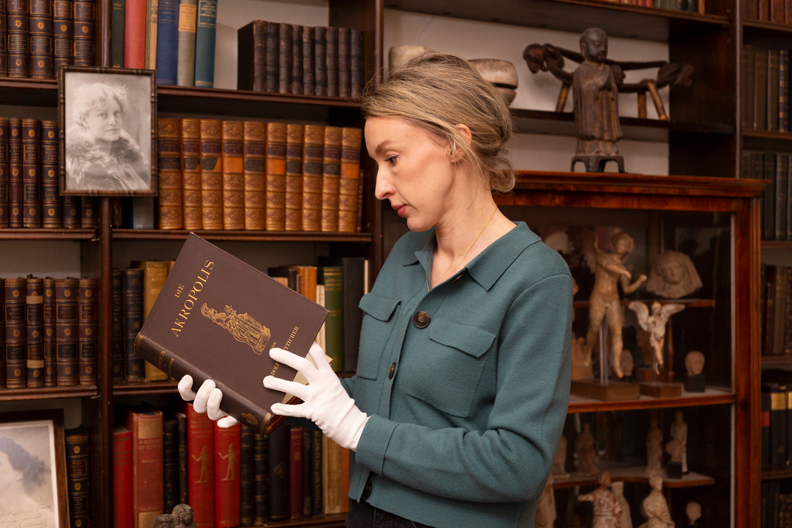 The Acropolis in Athens was a site of particular significance for Freud. When he visited it for the only time in 1904 with his brother Alexander, he experienced a strange feeling of disbelief in the reality of his surroundings that ‘troubled him for years’. In an open letter to Romain Rolland on his 70th birthday in 1936, Freud would describe this experience as a feeling of ‘derealisation’, grounded in the dynamics of the Oedipus complex.
The Acropolis in Athens was a site of particular significance for Freud. When he visited it for the only time in 1904 with his brother Alexander, he experienced a strange feeling of disbelief in the reality of his surroundings that ‘troubled him for years’. In an open letter to Romain Rolland on his 70th birthday in 1936, Freud would describe this experience as a feeling of ‘derealisation’, grounded in the dynamics of the Oedipus complex.
The presence of Boetticher’s lavishly illustrated volume on Freud’s shelf, along with many other titles of the subject, shows Freud as a lifelong ‘philhellene’ (lover of Greek culture).
Author: Boetticher, Adolf
Publication: Berlin: J. Springer, 1888
Adoption: £700
Der Wahn und die Träume in W. Jensens "Gradiva"
This book has already been adopted and is no longer available
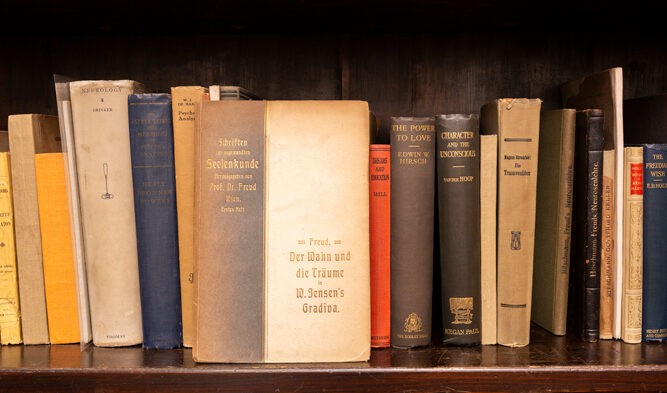 In 1907, Freud published his first full length analysis of a work of literature, Wilhelm Jensen’s ‘Pompeiian Fantasy’ novella entitled Gradiva. Freud was charmed by this short story, recommended to him by Jung, which tells of how a young archaeologist falls in love with the figure of a woman depicted in a bas-relief. The story not only appealed to Freud’s archaeological tastes, but also offered him an opportunity to illustrate the techniques of psychoanalysis, as the protagonist’s journey from delusion to reality could be compared to the analysand’s resolution of neurotic conflict on the psychoanalyst’s couch.
In 1907, Freud published his first full length analysis of a work of literature, Wilhelm Jensen’s ‘Pompeiian Fantasy’ novella entitled Gradiva. Freud was charmed by this short story, recommended to him by Jung, which tells of how a young archaeologist falls in love with the figure of a woman depicted in a bas-relief. The story not only appealed to Freud’s archaeological tastes, but also offered him an opportunity to illustrate the techniques of psychoanalysis, as the protagonist’s journey from delusion to reality could be compared to the analysand’s resolution of neurotic conflict on the psychoanalyst’s couch.
Freud’s copy of the first edition of his Delusions and Dreams in Jensen’s ‘Gradiva’ has his signature on title page: Dr Freud 8.5. [19]07.
Author: Freud, Sigmund
Publication: Leipzig/Vienna: H. Heller, 1907
Adoption: £700
Sigmund Freud
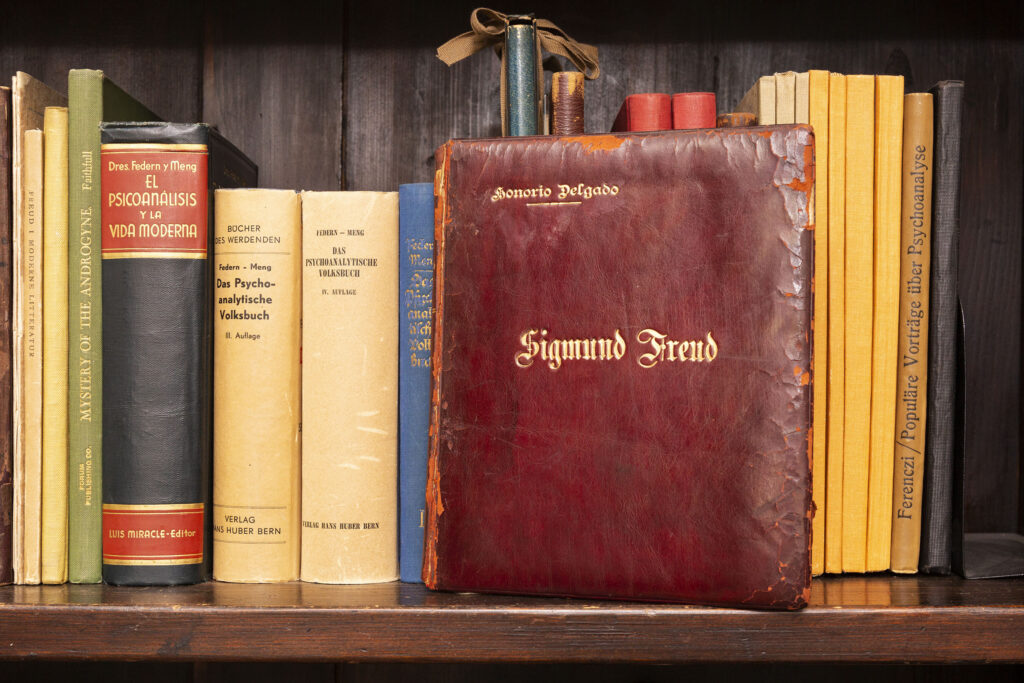 This biography of Freud, written in Spanish by the Peruvian psychiatrist Honorio Delgado, bears testament to the global spread of psychanalysis. Delgado, whom Freud described as his ‘first foreign friend’, was one of the central figures in the dissemination of his ideas across Latin America. Delgado also most likely gifted Freud one of the most striking objects in his study, the Peruvian vessel figure of a dignitary, dating from the Moche civilization c. 200 AD. Freud had a decade-long correspondence with Delgado and was thrilled at the evangelical work that he undertook for the psychoanalytic profession.
This biography of Freud, written in Spanish by the Peruvian psychiatrist Honorio Delgado, bears testament to the global spread of psychanalysis. Delgado, whom Freud described as his ‘first foreign friend’, was one of the central figures in the dissemination of his ideas across Latin America. Delgado also most likely gifted Freud one of the most striking objects in his study, the Peruvian vessel figure of a dignitary, dating from the Moche civilization c. 200 AD. Freud had a decade-long correspondence with Delgado and was thrilled at the evangelical work that he undertook for the psychoanalytic profession.
There is a dedication on page 7 of the volume from Delgado to Freud which reads: Al insigne Maestro Prof. Dr. Sigm. Freud, en testimonio de profunda admiración y respeto. HF Delgado Lima 1.VII.[19]26.
Author: Honorio Delgado
Publication: Lima: C. F. Southwell, 1926
Adoption: £700
La Divina Commedia
This book has already been adopted and is no longer available
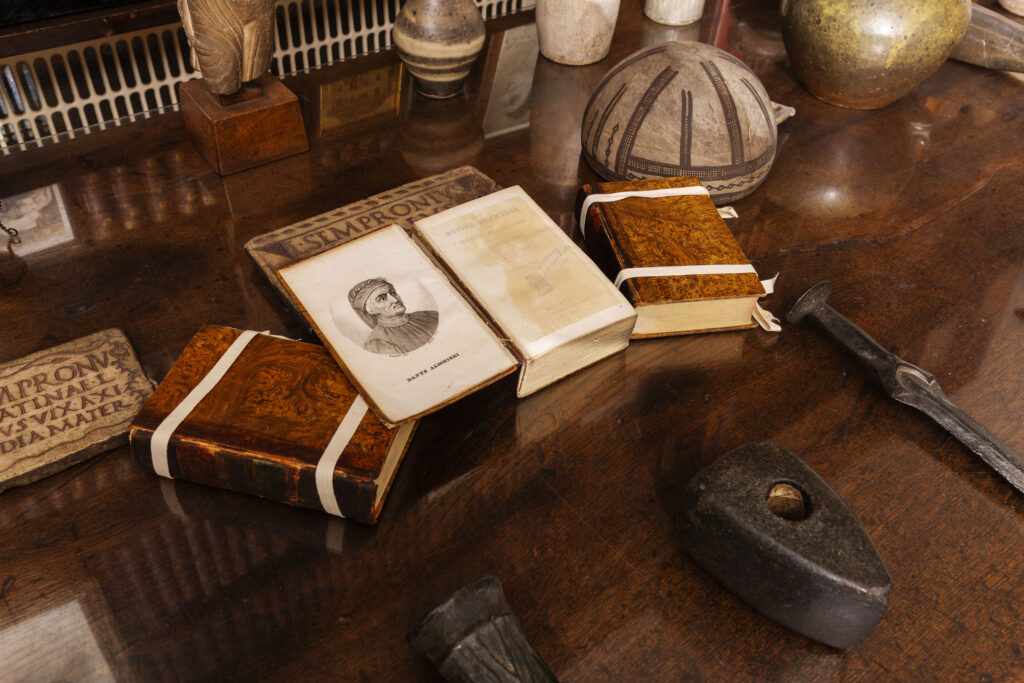
Freud chose the lines from Virgil’s Aeneid, ‘if I cannot bend the gods above, I’ll rouse the gods below’, as the epigram for the Interpretation of Dreams, and thus announced the appearance for the new science of psychoanalysis. In the first volume of Dante’s Divine Comedy, one of the highest peaks of Renaissance humanism, the author is guided through the perilous Inferno by the Latin poet Virgil, towards the light of understanding and truth, a journey that has parallels with the treatment of psychoanalysis.
The front page of each of all three volumes is signed and dated Sig Freud 25/7/[18]76. There is another signature on the title pages of all three volumes: Carl Moering, Venedig, Ingenieurs-Lieut.,1831. This was the original owner of the volumes before Freud.
Author: Dante Alighieri (ed. G. Baglioli)
Publication: Milan: G. Silvestri, 1829
Adoption: £950 (3 Volumes)
Studien über Hysterie
This book has already been adopted and is no longer available
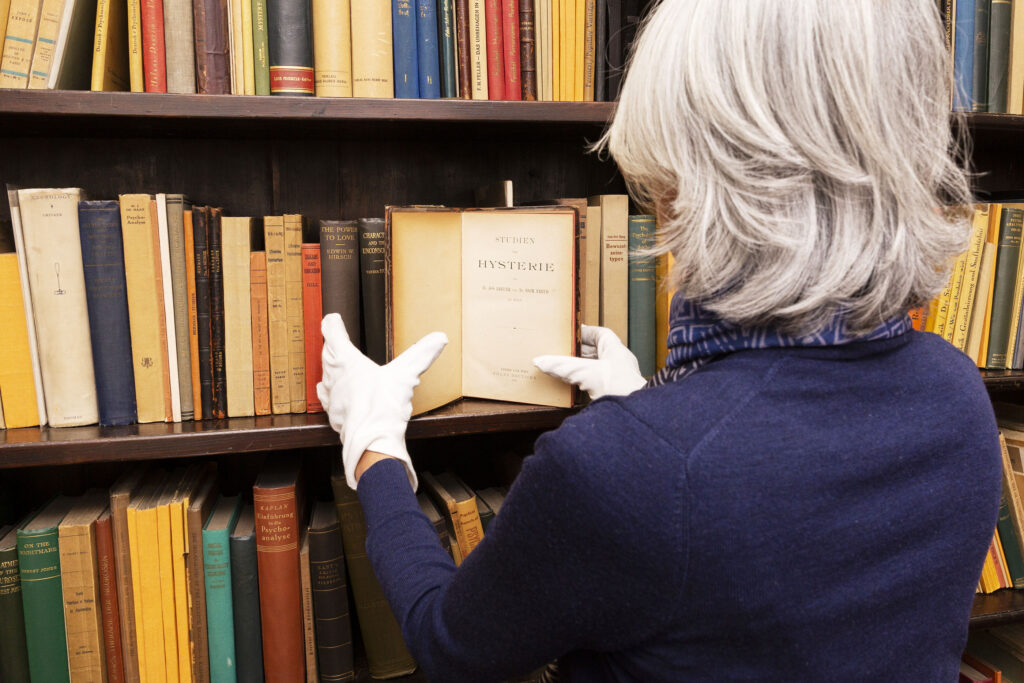 Co-authored with Joseph Breuer, Studies on Hysteria was the text that paved the way for the advent of psychoanalysis. Describing a radical new treatment called the ‘cathartic method’, Freud and Breuer’s case studies became the models of psychoanalytic intervention, or as the first patient described in this collection, Anna O would put it, they gave birth to the ‘talking cure’.
Co-authored with Joseph Breuer, Studies on Hysteria was the text that paved the way for the advent of psychoanalysis. Describing a radical new treatment called the ‘cathartic method’, Freud and Breuer’s case studies became the models of psychoanalytic intervention, or as the first patient described in this collection, Anna O would put it, they gave birth to the ‘talking cure’.
Freud own copy of the first edition of Studies on Hysteria has annotations on p.178 and has several marginal markings, but these appear not to have been made by Freud.
There are even some typographical corrections on pages 16, 30, and 33; maybe Freud was checking his publication here, but we have no way of knowing.
Author: Freud, Sigmund & Breuer, Josef
Publication: Leipzig/Vienna: F. Deuticke, 1895
Adoption: £700
The Works of Lord Byron
This book has already been adopted and is no longer available
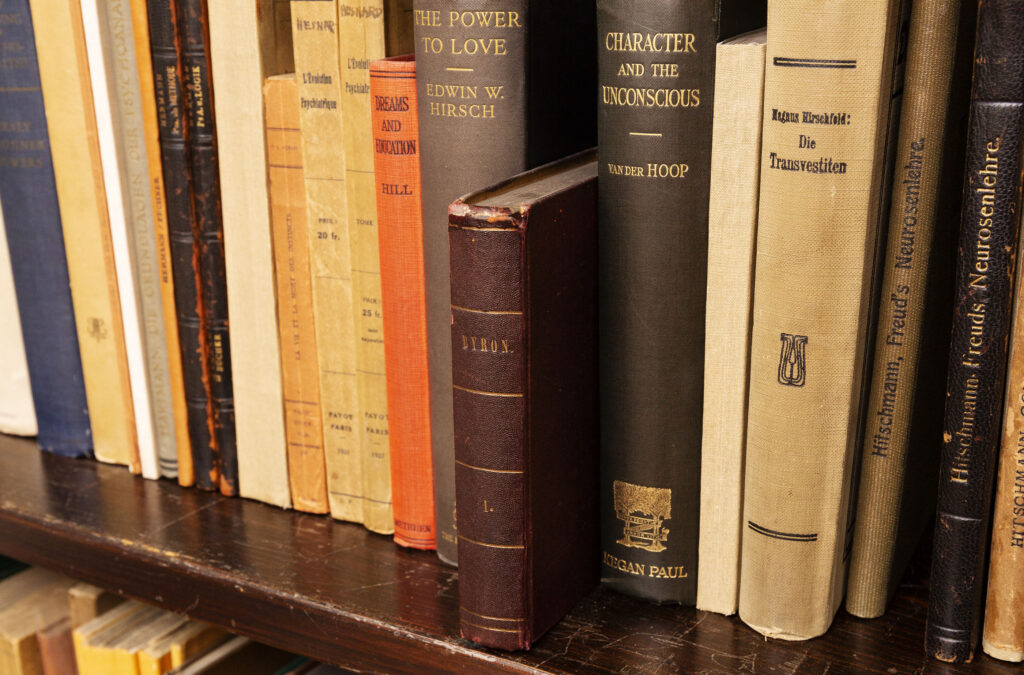
Freud was a great admirer of the work of Lord Byron. He gave his daughter Anna passages from the Romantic poet’s Hebrew Melodies to translate in order to improve her English prior to her trip to England in 1914, remarking that she ‘translates English poets very beautifully into German verse’. He also drew on Byron’s dramatic poem Manfred in his analysis of the Schreber case in 1911.
This is volume one of a five volume collection of Byron’s works. It was published as part of the series Collection of British Authors, with Byron coming in as Volume 8. One of these volumes is signed ‘Prof. Sigm. Freud’ on its title page, and they are all embossed with their book binder’s stamp: G. Rautter, Wien 1.
Author: Byron, Lord [George Gordon Noel Byron]
Publication: Leipzig: B. Tauchnitz, 1842
Adoption: £700
